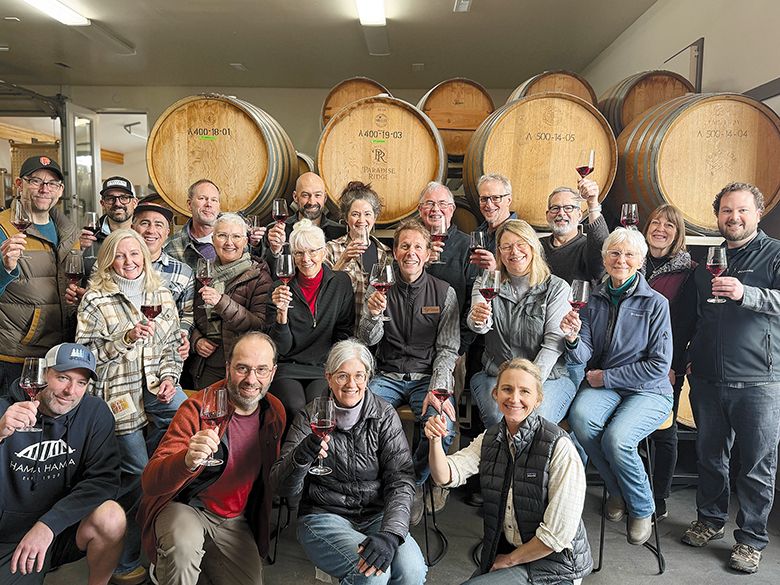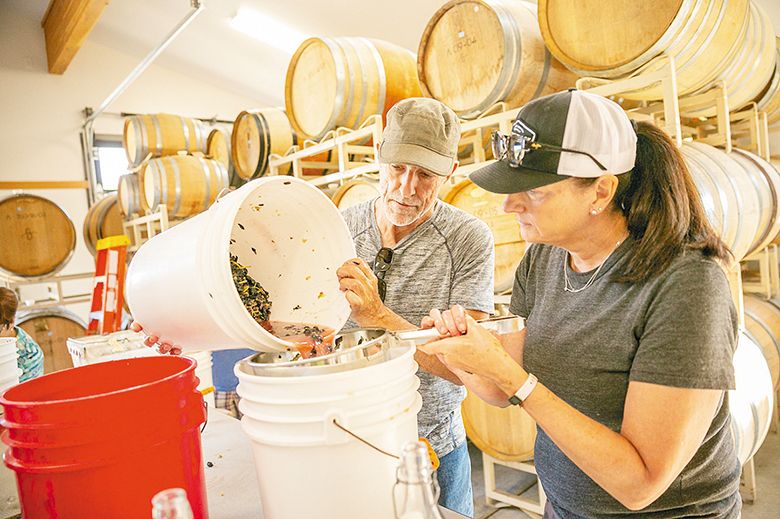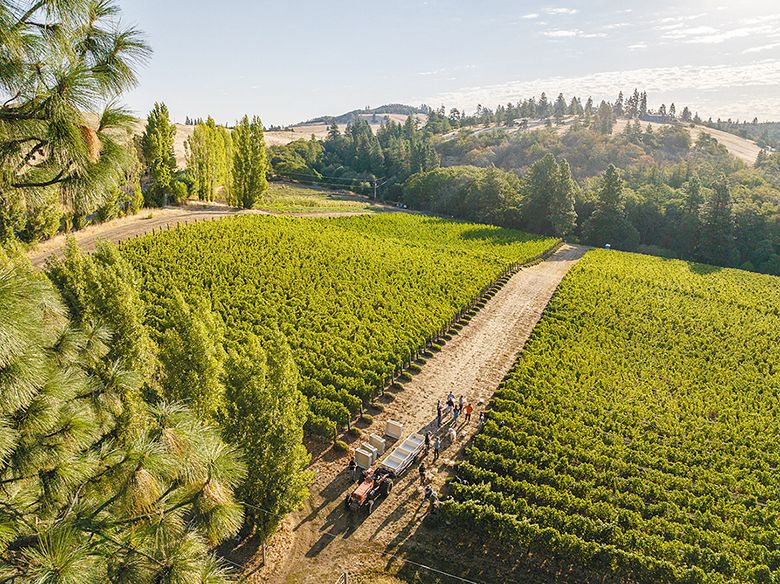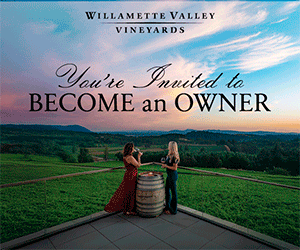Vinology Vérité
Columbia Gorge biodynamic winery hosts innovative winegrower series



By Neil Ferguson
Picture spring in the Columbia Gorge: a small group of casual and serious wine lovers are awake at dawn. They mull around exchanging small talk before Analemma Wines co-founders Steven Thompson and Kris Fade announce the day’s activity: Biodynamics in the Vineyard. Nestled in the hills above the tiny town of Mosier, between Hood River and The Dalles, Fade and Thompson have farmed the land since 2010.
From Analemma’s tasting room patio, there are sweeping views of rolling hills covered in orchards. Abundant in pears, cherries and peaches, it’s an enchanting, visual reminder how Oregon’s winegrowing regions are far from a monoculture. It’s here Thompson and Fade host one of the state’s most unique winery experiences– possibly even the entire world’s.
Beginning with the day’s activity– the biodynamic process of spreading compost tea to inoculate the vineyard– the group embarks on an immersion 12-month journey of growing and making wine. During the Winegrower Series, they will conduct comparative tastings of Trousseau from around the world to determine a targeted flavor profile, assess brix and ripeness, provide feedback on the label, hand-harvest and process grapes and, finally, bottle their wine. The purpose is educating, inspiring and, ultimately, promoting a sense of community by creating deeper connections to their wines.
At a time when wineries desperately try to appeal to drinkers with authentic storytelling, Analemma’s series allows customers active roles in the story.
Between sessions on a peaceful winter day, Thompson explains Analemma’s education-focused approach and why it works. “Kris and I have always had a desire to educate, not only how our wine is made but also how it's grown. We are winegrowers who believe deeply in regenerative agriculture. This feels like an extension of what we’ve done in the tasting room.” he says.
“We sought to take it a step further by gathering a group interested in diving deep into the entire growing season. They not only make the wine in the fall but also bottle it in the spring. It stems from our passion for education– the same desire that led us to start Analemma.”
Each time the group gathers for a session, soft-spoken Thompson exudes an easygoing warmth and starry-eyed fascination while explaining the day’s activity.
Over the course of the spring (compost spreading), summer (comparative tasting, brix and ripeness monitoring), fall (harvesting and processing), and the following spring (bottling), Thompson guides the group with the style of a relaxed camp counselor. No question is off limits, even “can you serve us a little more wine with lunch?” Participants are rewarded for their hard work with a delicious meal using ingredients grown on the farm. Naturally, conversation about wine, farming and life follows.
Before falling head over heels with being a winemaker and farmer, Thompson’s experience included working as an international bicycle tour guide. During each Analemma session, he educates by engaging a curious group. Fade’s approachable conversational style is a perfect complement, creating a dynamic conducive to sharing knowledge.
“Our previous work parlays easily to hosting groups and giving farm tours. Rather than teaching about the country and anticipated travel discoveries, we're educating visitors about our farm, farming and wine,” he says. “People want an experience beyond sitting at a table and listening to wine descriptors.”
Analemma developed a reputation for its complex, yet smooth natural wines made with unexpected grapes like Mencia, Tinto, Godello and the coveted Petit Manseng. The winery attracts people searching for alternatives to Willamette Valley Pinot Noir or big Washington reds. Analemma’s wines, lean and elegant, display the unique terroir, often with slightly lower alcohol levels. The group’s decision to produce Trousseau is a testament to the types of wine geeks drawn to Analemma.
Thompson considers the series an opportunity to explore the “mystery of farming and the complexity and intelligence of nature.” He enjoys showcasing the quality of wine produced from true stewardship. “There are no add-ons. We're not doing chemical trickery or anything… just harvesting the fruit, fermenting with native yeast, aging it in the barrel and putting it in the bottle. It becomes super-easy to understand, and people appreciate that,” observes Thompson.
Analemma’s Winegrowers Series didn’t originate from a marketing brainstorm session but rather the desire to create a deeper, more tangible experience in which participants could literally enjoy the fruits of their labor. They also gain a perspective on the reciprocal relationship connecting stewardship and farming with harvest, fermentation and ultimately, tasting wine. Thompson and Fade want people to dirty their hands (and feet) digging through soil, waving off yellowjackets while carefully snipping ripe clusters off vines, then stomping those same grapes.
“We’ve created a participatory way to understand everything we do as winegrowers, from spreading the compost tea in the vineyard to measuring the sugar and acid content… and tasting the juice. From harvesting fruit on an early September morning to foot-stomping the grapes to hand-filling and hand-label the bottles.
People experience the magic, developing a connection with our place and brand,” says Thompson.
While those who worked harvests might smile at the concept of paying money rather than being paid to participate, Thompson saw the potential for a special experience. Leading the group prompted a reexamination of his own philosophy of winemaking and farming.
“It brings me back to what's called the beginner's mind and first-time experiences. The joy of discovery and learning something new and trying something different. Having folks around who are seeing it for the first time helps remind me of that,” he notes.
For Thompson and Fade, limiting the group to 15-20 allows time to interact personally with each participant. Analemma remains the only winery in Oregon offering such an experience. Doing so provides yet another opportunity to tell their story and share their farming practices, winemaking process and commitment to sustainability with the broader public.
“A primary reason the series works is because we're a grower-producer. It highlights how small is beautiful. It wouldn’t work nearly as well for a larger winery lacking vineyards or a vineyard manager unwilling to work with individuals out there or in the cellar,” explains Thompson.
On a chilly March day, the group gathers one final time. Even with the Saturday morning grogginess, the excitement is palpable as people eagerly chat about the task ahead: bottling. This is their baby, after all, the wine they have guided from bud to bottle. As Fade and Thompson dash between stations, participants assume a sort of assembly line– bottling, corking, drying, labeling and packaging the bottles. After all the cases are packed, everyone enjoys a glass of Trousseau directly from the bottle filler. They toast the journey, each confiding what it meant to them. Thompson and Fade express gratitude for what the group has accomplished.
Of course, the feeling of accomplishment holding the product they worked so diligently to create is wonderful, yet the real triumph is the shared sense of community. By the end, it’s clear Thompson, Fade and the rest of Analemma’s team have given participants more than a couple bottles of wine. They’ve provided people with a better understanding of wine’s complete lifecycle. Participants retain an experience that will linger far after the last bottle is finished.
“We’ve learned it's a good program. It works. People appreciate it just as much as we thought they would,” reflects Thompson.
As the wine industry faces challenging headwinds (declining consumption, competition from other beverages and cannabis, a fervent neo-Prohibitionist movement and growing inflation), storytelling and creativity matter more than ever. Who knows if this model could work for other wineries. Nonetheless, it certainly reminds us how wine creates connections and fosters a strong sense of camaraderie.
Neil Ferguson is a journalist, editor and marketer. Originally from the tiny state of Rhode Island and spending his formative years in Austin, Texas, he has long focused his writing around cultural pursuits, whether they be music, beer, wine or food. Neil previously worked as director of marketing for the Oregon Wine Board. He currently contributes regularly to Willamette Week, Sip Magazine, The New School, Glide Magazine and other outlets. Read more at www.neilferguson.work.










